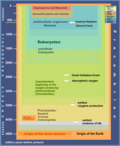Late Heavy Bombardment
The Late Heavy Bombardment (LHB) or lunar cataclysm happened about 4.1 to 3.8 billion years ago. During this time, a large number of impact craters formed on the Moon. By inference, the same thing happened on Earth, Mercury, Venus, and Mars as well.[1]
The evidence for this event comes from the dating of lunar samples. This shows that most impact melt rocks formed at that time. Many hypotheses have been suggested to explain how asteroidal or cometary material got into the inner solar system, but no consensus yet exists.[2]
One popular theory is that the gas giant planets (or at least Jupiter) migrated in orbit at this time: see Grand tack hypothesis. This caused objects in the asteroid belt and/or Kuiper belt to be forced into orbits which reached the terrestrial planets.
Some think that the apparent clustering of impact melt ages near this time is an artifact of sampling.[3][4]
This topic is part of the formation and evolution of the Solar System.
Late Heavy Bombardment Media
Simulation showing outer planets and planetesimal belt: (a) Early configuration, before Jupiter (green) and Saturn (orange) reach 2:1 resonance; (b) Scattering of planetesimals into the inner Solar System after the orbital shift of Neptune (dark blue) and Uranus (light blue); (c) After ejection of planetesimals by planets.
Related pages
References
- ↑ Fazekas, Andrew (March 24, 2015). Observe: Jupiter, Wrecking Ball of Early Solar System. National Geographic. Archived from the original on March 14, 2017.[1]
- ↑ Simpson J.A.; Weiner E.S.C. 1989. Jupiter. Oxford English Dictionary. Vol. 8 (2nd ed), Clarendon Press. ISBN 978-0-19-861220-9
- ↑ Taylor G. Jeffrey 2006. Wandering gas giants and lunar bombardment
- ↑ Cohen B.A; Swindle T.D., & Kring D.A (2000). "Support for the Lunar cataclysm hypothesis from lunar meteorite impact melt ages". Science. 290 (5497): 1754–1755. Bibcode:2000Sci...290.1754C. doi:10.1126/science.290.5497.1754. PMID 11099411.
{{cite journal}}: CS1 maint: multiple names: authors list (link)

